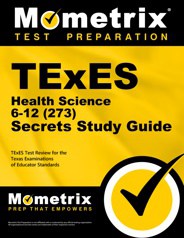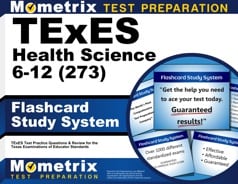The TExES Health Science 6-12 (273) exam is an assessment test designed to test the knowledge of entry-level educators wanting to teach 6th-12th-grade Health Science in the Texas public school system.
Click “Start Test” above to take a free TExES Health Science 6-12 practice test!
TExES Health Science 6-12 Exam Outline
The TExES Health Science 6-12 exam contains a total of 100 selected-response questions, and you will be given 4 hours and 45 minutes to complete it.
Teaching Standards
The TExES Health Science 6-12 exam is aligned with the ten standards for educators that have been outlined by the State Board for Educator Certification.
Click the button below to see the full list of approved educator standards:
Approved Educator Standards
- Academics: The teacher is proficient in the subjects needed to teach the approved statewide curriculum for their chosen subject and grade levels.
- Communication: The teacher is proficient in both verbal and nonverbal communication.
- Health and Wellness: The teacher understands and applies health, wellness, and disease prevention to promote healthy habits and behaviors.
- Health Care Systems: The teacher understands health care workers and the functions of diagnosis, therapeutic, informational, and environmental systems of health care.
- Employability: The teacher utilizes their professional work experiences in the health care delivery system to help students prepare for careers in the health care industry.
- Safety: The teacher understands industry safety policies and protocols regarding safety procedures to prevent or minimize injury and illness.
- Ethical and Legal Issues: The teacher understands the ethical and legal issues and responsibilities of health care workers.
- Teaming: The teacher understands the importance of teamwork and leadership skills regarding quality health care and effective student instruction.
- Partnerships: The teacher understands developing partnerships with the parents and guardians, educating institutions, and the community to enhance student education and strengthen the health science technology education program.
- Professional Development: The teacher understands the role that lifelong learning and continuing professional development play in the health industry.
Exam Domains
The exam is split into four domains, each of which covers one or more of the ten standards mentioned above.
| Domain | Percentage of Exam | Standards Used |
|---|---|---|
| 1. Academic Foundations | 19% | I |
| 2. Medical Sciences | 19% | I |
| 3. Occupational Knowledge | 43% | I, III, IV, VI |
| 4. Professional Responsibilities | 19% | II, V, VII-X |
For the questions in this domain, you will be asked to demonstrate your knowledge of the following:
- Major historical events concerning the development of healthcare and how those events impacted society
- Applying academic skills to health science
- Scientific methods
- The impact of scientific research on health science
- Organizing and communicating conclusions from experimental data
- Healthcare-related terminology
2. Medical Sciences
For the questions in this domain, you will be asked to demonstrate your knowledge of the following:
- The anatomical structures of the human body
- How anatomical structures relate to the functions and processes that maintain homeostasis
- How microorganisms relate to health
- The role of microorganisms in infectious diseases
- Pathology mechanisms
- Pathogenesis
- The effects of disease prevention and control
3. Occupational Knowledge
For the questions in this domain, you will be asked to demonstrate your knowledge of the following:
- The aging process
- The psychological effects of aging
- The sociological implications of aging
- The foundations of nutrition
- Therapeutic concepts of nutrition
- Social and cultural issues pertaining to nutrition
- Pharmacology concepts
- Pharmacology technology
- Mental health concepts
- Social and cultural issues pertaining to mental health
- Wellness fundamentals
- Preventative health behaviors
- Health care skills and roles
- The diagnostic, environmental, informational, and therapeutic functions of healthcare
- Maintaining a safe environment
- The roles of regulatory agencies
- Safety policies, procedures, and precautions
4. Professional Responsibilities
For the questions in this domain, you will be asked to demonstrate your knowledge of the following:
- Communicating appropriately in medical environments
- The importance of teamwork and leadership
- Developing partnerships
- Preparing students for successful careers
- The importance of lifelong learning
- The continuation of professional development
- The ethical and legal responsibilities of healthcare workers
Check Out Mometrix's TExES Health Science 6-12 Study Guide
Get practice questions, video tutorials, and detailed study lessons
Get Your Study Guide
Exam Registration
To register for the exam, you will need to create a Pearson testing account online. When creating your account, you will need to enter your TEA ID number in order for your testing results to be linked to your TEA profile. If you do not have a TEA number, create a online TEA account. Click on the ECOS options at the top of the toolbar and then create a login and account. Once you have completed your profile on this page you will be given a TEA ID number.
It is important to note that some testing centers may require proof of vaccination status as a result of local COVID-19 guidelines.
Fees
The cost of the exam is $116 and must be paid using a debit or credit card. Cash and personal checks will not be accepted.
You will have the option to reschedule or cancel your appointment to test up to 48 hours before testing time. If you choose to cancel your exam, you will be refunded all but $25 of your testing fee.
How to Study
Think you aren’t a good test-taker? Maybe on a study-time crunch? Or just don’t know how to begin studying? Mometrix has designed a new Study Secrets course to help every student, no matter what study scenario you are in. Here’s what you’ll find in the Study Secrets Course:
- Techniques to Conquer Procrastination
- Steps to building a Study Plan custom to your learning style
- 7 Effective Note-Taking Methods
- Test-Taking Tips
- Memory Techniques and Mnemonics
- And much more!
Everyone learns differently, so we’ve tailored our Study Secrets Course to ensure every learner has what they need to prepare for their upcoming exam or semester. Click below to check it out!
Test Day
You should arrive at the testing site 15 minutes before the exam is scheduled to begin. Depending on the testing center, you may be asked to wear soft-soled shoes so you can help keep the testing environment as quiet as possible.
When you arrive, you will be asked to present two pieces of identification. At least one form of ID must be a photo ID.
You will not be allowed to bring the following into the testing room:
- Smoking materials, including vaping devices and tobacco products
- Any visitors
- Any weapons
- Cell phones
- Electronic communication devices
- Packages or bags (backpacks, briefcases, purses)
- Slide rules, rulers, or highlighters
- Hats or other headwear
- Barrettes or hair clips
- Hairbands or headbands
- Handwritten paper materials such as notes
- Notebooks, dictionaries, or scratch paper
- Calculators
- Eyeglasses that have communication or recording ability (your glasses may have to be inspected by the test monitor at the time of testing)
How the Exam is Scored
The TExES Health Science 6-12 exam is scored on a scale of 100-300. The minimum score you need to pass is 240.
Each question is assigned a different number of points according to the difficulty of the question. This system of scoring makes it impossible to determine the exact number of questions a candidate must answer correctly to achieve the 240 minimum points.
When you receive your score report, which will be made available 3-4 days after testing, it will simply indicate your pass/fail status. Your scores will be reported to you, TEA, and to your educator preparation program. The results of your scores will not be given out by phone, fax, or in person. You can only access the scores on your account page.
You will have the option to cancel your scores once the exam is complete. If you choose to cancel the scores, they will be reported to no one, and the exam you just took will not be considered in the five attempts you are allowed to pass the exam. You will, however, have to wait the obligatory 30 days to retake the exam.
How to Prepare for the Exam
How to Study Effectively
Your success on TExES test day depends not only on how many hours you put into preparing but also on whether you prepared the right way. It’s good to check along the way to see whether your studying is paying off. One of the most effective ways to do this is by taking TExES Health Science 6-12 practice tests to evaluate your progress. Practice tests are useful because they show exactly where you need to improve. Every time you take a free TExES Health Science exam practice test, pay special attention to these three groups of questions:
- The questions you got wrong
- The ones you had to guess on, even if you guessed right
- The ones you found difficult or slow to work through
This will show you exactly what your weak areas are and where you need to devote more study time. Ask yourself why each of these questions gave you trouble. Was it because you didn’t understand the material? Was it because you didn’t remember the vocabulary? Do you need more repetitions on this type of question to build speed and confidence? Dig into those questions and figure out how you can strengthen your weak areas as you go back to review the material.
Answer Explanations
Additionally, many TExES practice tests have a section explaining the answer choices. It can be tempting to read the explanation and think that you now have a good understanding of the concept. However, an explanation likely only covers part of the question’s broader context. Even if the explanation makes sense, go back and investigate every concept related to the question until you’re positive you have a thorough understanding.
Comprehend Each Topic
As you go along, keep in mind that the Health Science practice test is just that: practice. Memorizing these questions and answers will not be very helpful on the actual test because it is unlikely to have any of the same exact questions. If you only know the right answers to the sample questions, you won’t be prepared for the real thing. Study the concepts until you understand them fully, and then you’ll be able to answer any question that shows up on the test.
Strategy for TExES Health Science Practice
When you’re ready to start taking practice tests, follow this strategy:
- Remove Limitations. Take the first test with no time constraints and with your notes and TExES Health Science 6-12 study guide handy. Take your time and focus on applying the strategies you’ve learned.
- Time Yourself. Take the second practice test “open book” as well, but set a timer and practice pacing yourself to finish in time.
- Simulate Test Day. Take any other practice tests as if it were test day. Set a timer and put away your study materials. Sit at a table or desk in a quiet room, imagine yourself at the testing center, and answer questions as quickly and accurately as possible.
- Keep Practicing. Keep taking practice tests on a regular basis until you run out of practice tests or it’s time for the actual test. Your mind will be ready for the schedule and stress of test day, and you’ll be able to focus on recalling the material you’ve learned.
Check Out Mometrix's TExES Health Science 6-12 Flashcards
Get complex subjects broken down into easily understandable concepts
Get Your Flashcards
FAQs
Q
How many questions are on the exam?
A
There are 100 selected-response questions on the TExES Health Science 6-12 exam.
Q
How long is the exam?
A
The time limit for the TExES Health Science 6-12 exam is 4 hours and 45 minutes.
Q
What is a passing score?
A
A passing score for the TExES Health Science 6-12 exam is 240. The exam is scored on a scale of 100-300.
Q
How much does the exam cost?
A
The TExES Health Science 6-12 exam costs $116.

